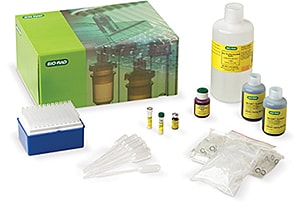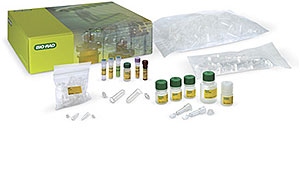Explore evolutionary relationships at the molecular level using DNA or protein. Students investigate the difference of DNA sequences or proteins of closely related species.

 Comparative Proteomics Kit I |
 DNA Barcoding Kits |
|
| Overview |
In this proteomics based lab, students analyze the differences of the actin and myosin muscle proteins to build an understanding that even closely related species exhibit considerable variation. |
Investigate the nuances of the cytochrome c oxidase I (COI) gene or the internal transcribed spacer (ITS) of your choice of fish, mammals, insects, or fungi. Investigate fraud happening at local marketplaces or explore species variations in local habitats. |
| Ideal For | Teachers who want to explore evolutionary relationships by examining fish muscle proteins and want to include protein gel electrophoresis (SDS-PAGE) in their classrooms | Teachers who want to introduce students to PCR, gel electrophoresis, DNA sequencing, bioinformatics, and potentially citizen science projects |
| AP Alignment | ||
| Pedagogical Support | 20 Questions to Master Inquiry - Protein Profiler Kit | Fish DNA Barcoding Kit Planning Guide, Biotechnology Explorer |
| Class Sessions | Three 45 minute classes | Varies |
| Inquiry Type | Open-ended | Open-ended |
| Required Equipment |
|
|
Teachers who bought these items, also bought:

PV92 PCR Informatics Kit
In this activity, students use real-world forensic techniques to extract DNA from their hair follicles or cheek cells, and then use PCR amplification and electrophoresis to fingerprint their own DNA.

Forensic DNA Fingerprinting Kit
The Forensic DNA Fingerprinting kit allows your students to use real DNA as evidence, as they play the role of crime scene investigator to figure out for themselves "Who done it?".

Got Protein? Kit
Based on the Bio-Rad Quick Start Bradford protein assay, this kit is designed to introduce students to proteomics and provides the tools for them to develop their own protein-based experiments.
